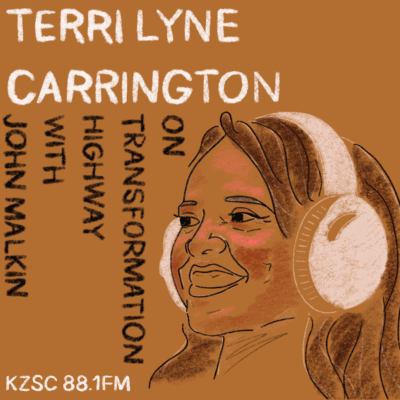
Terri Lyne Carrington began playing drums when she was five years old, beating out rhythms on her grandfather’s drumkit. Her father was also a saxophonist and drummer and her musical aspirations were supported by family and friends. If others admonished, “Drums aren’t for girls,” Carrington recalls, “I just didn’t pay attention to them.” Forty years down the road Carrington has recorded and toured with many cutting-edge musicians including Herbie Hancock, Wayne Shorter and Esperanza Spalding. Just last week she performed with Jack DeJohnette, who was one of her main mentors.
Carrington is founder and artistic director of the Institute for Jazz and Gender Justice at the Berklee College of Music and her two Mosaic Project albums brought together women instrumentalists and vocalists including Chaka Khan and Natalie Cole. She’s also the first woman to win a Grammy Award in the Best Jazz Instrumental Album category in 2013 for Money Jungle: Provocative in Blue.
Terri Lyne Carrington’s current band is called Social Science and their 2019 album Waiting Game is eclectic and powerful bringing together jazz, hip-hop, rock, opera and avant-garde musical styles to shine a light on the long history of social justice struggles in this country and on-going movements toward intersectional justice.
Jazz and Social Justice
JM: “There’s a great tradition of social justice within the world of Jazz. I think of artists like Nina Simone, Charles Mingus and Fela Kuti. With your band Social Science, you’ve combined innovative music with powerful political messages. Tell me about that.”
Terri Lyne Carrington: “I think you’re right about Jazz having a history of being involved with social justice. But missing is one important element of social justice work; gender equity. We’re at a time now where everybody seems to be pointing out that these things are connected; racial justice, gender justice and all the other struggles. People are seeing the intersection between all of these struggles now, which is great. Because a lot of Black women, for instance, have felt that they had to choose what they wanted to fight for; racial justice or gender justice. And most came to the conclusion, “I’m a Black woman. How can I prioritize one over the other?” All the justice struggles are connected. I always tell my students, “You’re in an Institute for Jazz and Gender Justice. How would that be if you go outside and litter? Or don’t treat the planet properly? Or don’t consider ableism?”
I’ve come to a place where I can shape music around those ideas. It took a while for my consciousness to really get there. But the important thing is to make sure the music sounds good! There’s a lot of people that have been ambitious with social justice projects. We’re seeing quite a few right now. And I appreciate that. But I’m not into it unless the music sounds good, too! (laughter) It’s tricky because sometimes it can get too heavy or too much like you’re preaching or didactic. All these things can happen when you try to merge that kind of consciousness with music. And you’re under a lot more scrutiny because you’re starting to tell more of a collective story, not just your own personal story.”
MUMIA ABU JAMAL
JM: “On the song “No Justice for Political Prisoners” we hear the voices of radical activists including Assata Shakur from the Black Liberation Army, long-imprisoned journalist Mumia Abu Jamal and abolitionist Angela Davis.”
Terri Lyne Carrington: “Angela Davis is one of my best friends. I just vacationed with her this August. I’ve always liked to work with speeches and people’s voices as a way for instrumental music to convey certain thoughts. I’ve grown accustomed to loving messages in vocal music and the emotion and magic that can happen when words and music come together. Getting Mumia to record that for the album was really a big highlight for me because I was going to just use a sample. I had to get clearances and when I talked to his attorney, she said Mumia didn’t want me to do it because I had to pay $200 to the prison to use his voice. He didn’t want that. So, he re-recorded it over the telephone.”
“What give you the right to kill so senselessly? Sirens swell morphing into church bells, signaling another unjustifiable death…”
— from “Bells Ring Loudly” by Terri Lyne Carrington & Social Science
(2019 Waiting Game album)
TIMES UP
JM: “It’s been amazing to see a worldwide explosion of the movement to end policing and replace it with real community safety. I’m so curious why this has happened now during the pandemic. Any thoughts?”
Terri Lyne Carrington: “If I had ideas about that I’d probably be doing something else for a living like writing or being a philosopher. I don’t know. But I’m happy that it’s happening. And I think that’s generally what happens; the heat of things come to a head at some point. History has always proven that progress is on the side of justice. Or we would still be slaves. I think it was just time; it has been time. Times up. You can’t believe that this is 2021 and some of this is still happening. In a modern society it’s just wrong to kill people without cause.
I’m just grateful I’m alive to see this shift taking place, because it definitely feels like a shift with a collective consciousness. I’m seeing shifts in other areas, too, because our students are really ahead of the game in this generation. It seems like they’re saying, “Stop. Enough is enough.” From gun laws to Black Lives Matter and everything else. I’m grateful that this generation has figured things out. I know that history has also proven that they (youth) are the leaders of most justice movements.”
HAVE TO BE RADICAL
JM: “Listening to your album Waiting Game I thought of Nina Simone who sang in “Mississippi Goddam” that, “They keep telling us to go slow. That’s the problem – go slow.” I think a lot of people are tired of being told to slow down with social justice.”
Terri Lyne Carrington: “You have to be radical. Things are messy when they’re changing and we can’t be afraid of that. There’s different schools of thought and I think it takes all approaches. It has to be kind of holistic. Some people are ‘gonna get more done in certain settings if they tailor their activism to that setting. Though a lot of people didn’t agree with Martin Luther King and nonviolence, he might’ve saved a whole lot of lives. You know what I mean? What I’m really trying to say is that we have to embrace the uncomfortable nature of it all, when things get messy. That’s for everybody.
I think about how I’ve been in situations where I’m uncomfortable talking about race in a room full of white people. But now I’m not. And that’s really liberating. If you look back at why you’re uncomfortable, there’s only a couple of reasons. One would be that you take on an extra burden of not wanting to make them uncomfortable. Another reason is; you’re kind of happy with the status quo of things. For a better and more equitable future for everybody, those two things I just mentioned really can’t be on the table.
I’m the type of person who is uncomfortable if other people are uncomfortable, because I don’t want people to be uncomfortable, right? But now I have to embrace that and say, “It’s not my problem.” They have to figure out how to not be uncomfortable. Or just because I function well in this boardroom or with the president of this organization or that college, it doesn’t mean that I stop advocating for other people that may not have the same opportunities and access that I’ve had.
What’s happened over the last year and a half or so has brought all those feelings and thoughts to the surface. Now we’re able to work them out. That doesn’t mean I’m saying it’s a black/white thing. I’m just saying people in general are able to work them out. Because if you start talking about gender justice, there’s a lot of women that are very comfortable with patriarchy. They’re benefiting or invested in it somehow. I’m not just trying to pull all the men in Jazz forward. Some of them are already there, even if they’re not fully educated or versed in it. While percentage wise, of course, there’s a lot more men in Jazz, there’s just as many women that are not progressive thinkers.”
NO GENRE PRISON
JM: “Tell me about bringing together so many styles of music and words.”
Terri Lyne Carrington: “I always tried to do that but it wasn’t embraced by labels. In fact, my second album got shelved. I was really happy when people started creating independent music without labels telling them what to do artistically. As labels started to fold, and more and more independent music was breaking through, it created an opening for people to not have to be so genre-focused. Basically, not to be in a genre prison. I felt like I could do more of what I had been trying to do and I also got better at doing it; mixing genres and having artistic freedom. When I started in 1989, it wasn’t really possible. But on this last album I collaborated with people that have different backgrounds. Matthew Stevens (guitars); some of his music is influenced by indie rock and Aaron Parks (keyboards) brings contemporary classical music. Our vocalist, Debo Ray, is from Haiti and she sings in different languages and was classically trained. Morgan Guerin is a multi-instrumentalist and very much into the new school of Jazz. And then adding a spoken word or hip-hop element with Kassa Overall was just a natural thing.”

